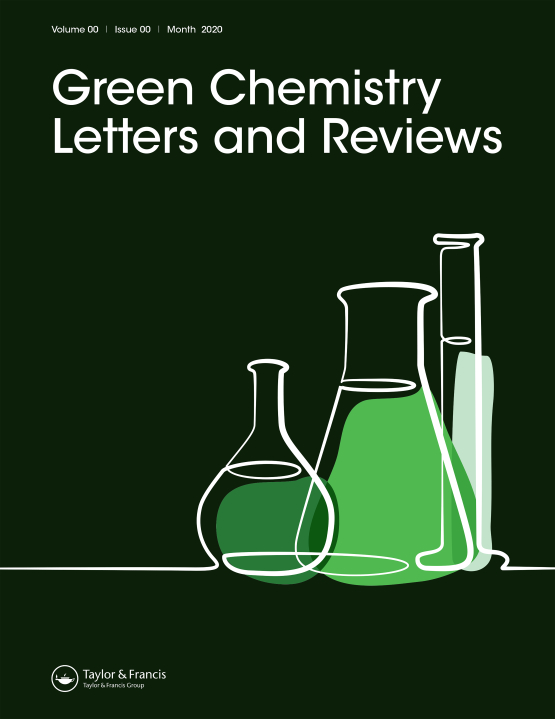Submit a Manuscript to the Journal
Green Chemistry Letters and Reviews
For an Article Collection on
Green Nanochemistry
Manuscript deadline
31 December 2024


Article collection guest advisor(s)
Gary Baker,
University of Missouri
[email protected]
Green Nanochemistry
Nanochemistry has the potential to revolutionize modern science, engineering, and technology and is poised to have a critical impact in all facets of human life, ranging from cleaner catalysis and improved agriculture to theragnostic advances and environmental remediation. Green nanochemistry seeks to create functional materials to enhance human health and prosperity but in a more sustainable way by considering all aspects of the process, cradle to grave.
Green nanochemistry has evolved from its early days focused mostly on the Edisonian phytochemical-mediated growth of nanostructures and now includes significant efforts to reclaim or upcycle waste products, stimulating positive socio-economic growth. Although green nanochemistry retains the nascent goal of lowering environmental hazards, more efficient use of expensive, non-renewable and critical resources, and boosting the resilience of societies and the environment, current efforts are also concerned with performance benchmarks and include the development of new strategies for addressing complex, global environmental problems (e.g., global warming, “forever chemicals”, micro- and nano-plastics). Ultimately, the spirit of green nanochemistry must embrace engineering and also encompasses a diverse range of sibling disciplines which engender an efficient platform for achieving the goals of creating goods and procedures that are secure, energy-efficient, waste-free, and economically-viable, with minimal environmental impact, such as emitting fewer greenhouse gases.
For this article collection, entitled “Modern Strategies in Green & Sustainable Nanochemistry”, we invite authors to submit original research papers, perspective and review articles related to eco-friendly nanochemistry, with possible topics including, but not limited to the following list:
- environmentally friendly nano-production
- green manufacturing and engineering
- lead-free (hybrid) perovskites
- nanophotocatalysis
- nanoscale strategies for PFAS destruction
- nanoparticles to promote wound healing
- reclamation of e-wastes
- pollution abatement
- wastewater treatment and water remediation
- waste to wealth
- utilization of carbon dioxide
The primary objective of this article collection is to highlight the latest, outstanding, and cutting-edge advances in this exciting and rapidly growing field of research.
Gary Baker received his Ph.D. in 2001 from the University at Buffalo working in the group of Professor Frank Bright. He was a Frederick Reines Postdoctoral Fellow at Los Alamos National Laboratory before transitioning in 2005 to Oak Ridge National Laboratory as a Eugene P. Wigner Fellow and research staff scientist. In 2011, he relocated to the University of Missouri where he is now an associate professor in the Department of Chemistry. Ongoing research in his group includes the design of artificial nanoclays having programmable surface chemistry, plasmon-driven photocatalysis, non-noble photoacoustic nanomaterials, advanced materials for water purification and reclamation, and engineered solvents (e.g., ionic liquids, deep eutectic solvents, zwitterionic liquids) tailored to solve diverse and challenging problems.
All manuscripts submitted to this Article Collection will undergo desk assessment and peer-review as part of our standard editorial process. Guest Advisors will not be involved in peer-reviewing manuscripts unless they are an existing member of the Editorial Board.
Please review the journal scope and author submission instructions prior to submitting a manuscript.
The deadline for submitting manuscripts is 31 December 2024.
Please contact Agnes Zhou at [email protected] with any queries regarding this Article Collection.
For Taylor and Francis Journals: Please be sure to select the appropriate Article Collection from the drop-down menu in the submission system.
Benefits of publishing open access within Taylor & Francis
Global marketing and publicity, ensuring your research reaches the people you want it to.
Article Collections bring together the latest research on hot topics from influential researchers across the globe.
Rigorous peer review for every open access article.
Rapid online publication allowing you to share your work quickly.
Looking to Publish your Research?
Find out how to publish your research open access with Taylor & Francis Group.
Choose open accessSubmission Instructions
All manuscripts submitted to this Article Collection will undergo desk assessment and peer-review as part of our standard editorial process. Guest Advisors for this collection will not be involved in peer-reviewing manuscripts unless they are an existing member of the Editorial Board. Please review the journal Aims and Scope and author submission instructions prior to submitting a manuscript.